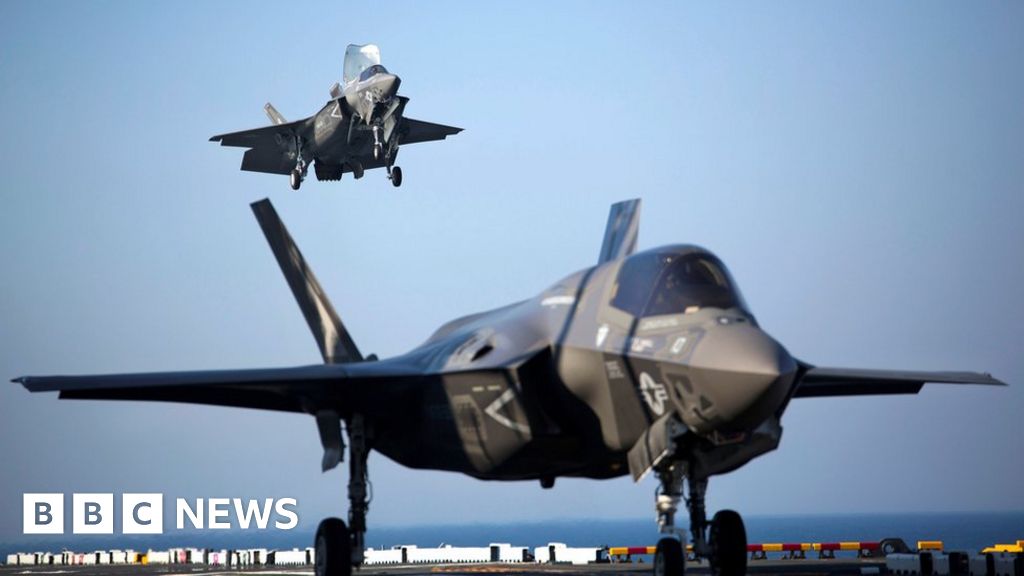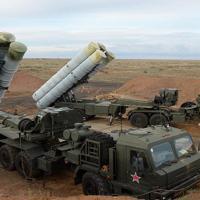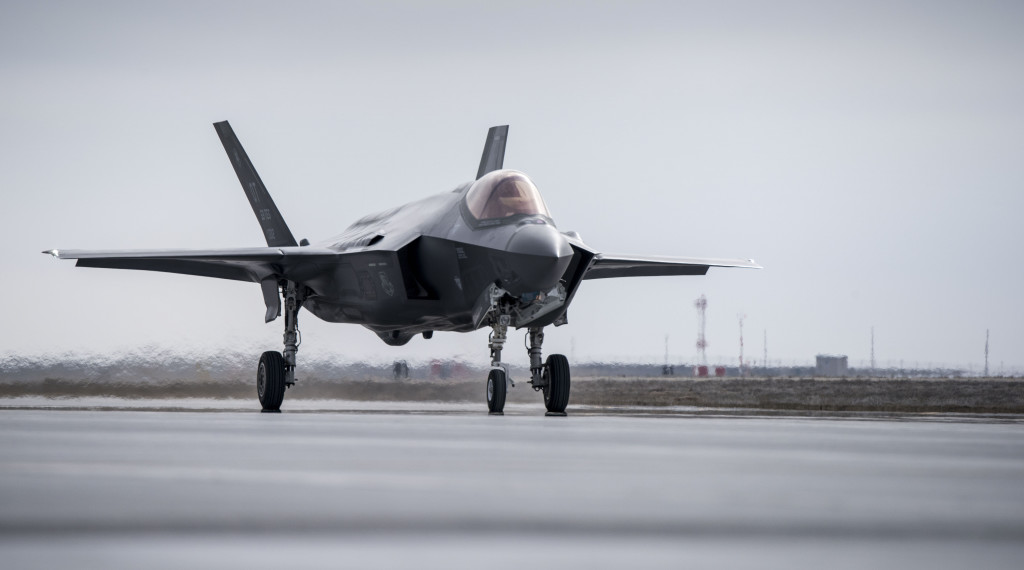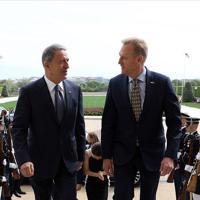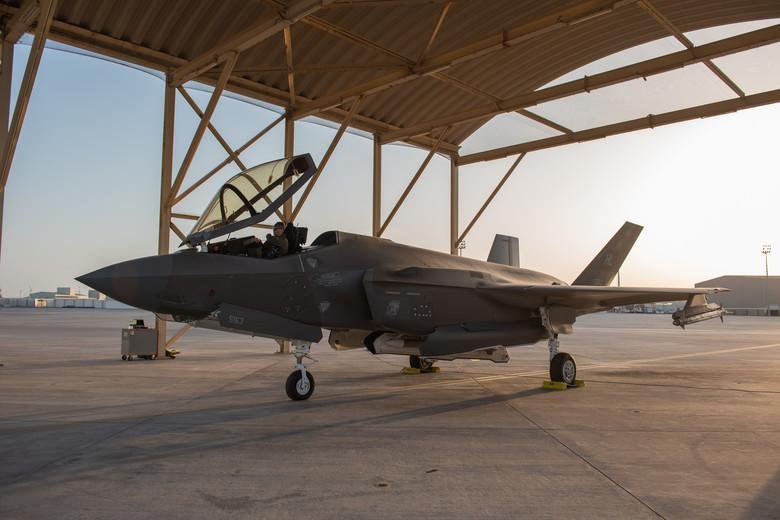Turkish suppliers to be eliminated from F-35 program in 2020
By: Valerie Insinna
08 June 2019
A mock-up of the F-35 cockpit is on display at an air show in Cigli, Turkey. (dardanellas/Getty Images)
WASHINGTON — The Pentagon is preparing to transfer Turkey’s industrial participation in the F-35 to other countries unless Ankara reverses course on its plans to
buy the Russian S-400 air defense system.
The move — which in early 2020 would end contracts with major Turkish defense contractors such as Turkish Aerospace Industries, Roketsan and Tusas Engine Industries, among many others — is just one of many steps the U.S. Defense Department intends to take to
strip Turkey from the F-35 program, according to a June 6 letter from acting Defense Secretary Patrick Shanahan.
The training of Turkish F-35 pilots at Luke Air Force Base in Arizona and of Turkish maintainers at Eglin Air Force Base, Florida, will also end, Shanahan wrote, and U.S. military exercises in Turkey are in jeopardy.
“If Turkey procures the S-400, as we discussed during our call on May 28, 2019, our two countries must develop a plan to discontinue Turkey’s participation in the F-35 program,” Shanahan wrote in the letter, which was addressed to his counterpart, Turkish Defense Minister Hulusi Akar. “While we seek to maintain our valued relationship, Turkey will not receive the F-35 if Turkey takes delivery of the S-400.”
However, Ellen Lord, undersecretary of defense for acquisition and sustainment, noted that Turkish participation in the program would be allowed to continue if it drops its plan to buy the Russian air defense system. The delivery of the S-400 could occur as early as this month.
“Turkey still has the option to change course. If Turkey does not accept delivery of the S-400, we will enable Turkey to return to normal F-35 program activities,” she told reporters Friday. “Turkey is a close NATO ally and our military-to-military relationship is strong.”
Turkey, a partner in the F-35 program that helped fund the development of the jet, plans to buy 100 F-35As.
Its first jet was rolled out in June 2018 in a festive “delivery ceremony,” but although Turkey formally owns its jets, the United States has the power to keep the planes from moving to Turkish soil and intends to keep all four existing Turkish jets from leaving the United States.
Lord told reporters that the Pentagon is still deciding what it will do
with Turkey’s jets. One option would be to buy the aircraft and repurpose them for the U.S. Air Force, but no official decision has been made.
Turkish companies are responsible for 937 parts used to build the F-35, with 400 of those sole-sourced from Turkish firms, Lord said. Existing contracts would go through a “disciplined and graceful wind down” period in “early 2020,” Lord said.
“If we can work to our timelines with the Turks, we would have
no major disruptions and very few delays,” she said.
Vice Adm. Mat Winter, the F-35’s program executive, said in April that 50-75 aircraft could be delayed over a two-year period if Turkey is removed from the program,
according to Breaking Defense. But Lord said those disruptions would occur only if the Pentagon terminated its supply chain agreements this summer.
Ultimately, prime contractors Lockheed Martin and Pratt & Whitney will make the decisions on
which subcontractors replace the Turkish vendors, but the Pentagon has identified new suppliers that could step up and make the parts currently sole-sourced by Turkey.
“They are predominantly U.S. sources. That’s not to say that we won’t continue to do what we always do with program management and look for other sources, because we would like to have second, third sources for most of the items,” she said.
The Defense Department has already stopped material deliveries to Turkey, halting the buildup of an engine overhaul facility that was planned to be built in and operated by Turkey.
“There are two other European MRO&Us [maintenance, repair, overhaul and upgrade facilities] that can absorb the volume with no issue whatsoever,” Lord said.
Despite Turkey’s industrial role in the program, Lord said she was confident that all important technical information would stay secure.
"We control what is downloaded from our computers. We have shared what's appropriate. The Turks have no critical documentation that we're concerned about,” she said.
What’s the impact on Turkish F-35 training?
The most immediate impact to Turkey, according to the letter from Shanahan, is that no new Turkish students will begin F-35 training at Luke Air Force Base. This defers the training of 20 students scheduled to begin training in June, as well as 14 students between July and November 2019.
“This training will not occur because we are suspending Turkey from the F-35 program; there are no longer requirements to gain proficiencies on the systems,” according to a document attached to the letter that spelled out the schedule for Turkey’s removal from the program.
In addition, the country will not be allowed to attend the annual F-35 Chief Executive Officer roundtable on June 12 — depriving Turkey of the opportunity to give input on any changes to the program’s governing documents.
But the most major day of reckoning is July 31, when Turkish personnel would no longer be allowed to access Luke Air Force Base in Arizona, where pilots are trained; Eglin Air Force Base in Florida, where maintainers are trained; or the F-35 Joint Program Office in Washington, D.C., where Turkish “cooperative project personnel” are stationed. Instead, the Turkish personnel must depart the United States and return to their country.
There are currently 42 Turkish military personnel training at Luke and Eglin — four pilots, and the rest maintainers. The July 31 deadline would allow 28 of them to complete their training, but the remainder would be sent home before their training naturally concluded, according to information attached to Shanahan’s letter.
The two Turkish instructor pilots based at Luke, who have completed the F-35 pilot training, would also be sent back to Turkey.
The larger impact
The situation with Turkey is fraught for myriad political and national security reasons. As the lone predominantly Muslim nation in NATO, Turkey occupies an important position in the alliance. The nation is also home to Incirlik Air Base, which is used by both the U.S. and Turkish air forces.
In the hopes of resolving the issue, the United States has sent technical teams to Ankara and hosted meetings in Washington to discuss the threat posed by the S-400 and the Pentagon’s offer of Raytheon’s Patriot air and missile defense system.
So far, those efforts have been unsuccessful, with Turkish President Recep Tayyip Erdoğan continuing to make strong statements in support of an S-400 buy and the country’s defense minister acknowledging that Turkish military personnel had been sent to Russia for training on the air defense system.
Asked whether a final decision to buy the S-400 should be interpreted as Turkey bolstering its relationship with Russia at the expense of NATO, Andrew Winternitz, acting deputy assistant secretary of defense for Europe, demurred.
“Our counterparts really want to continue our really strategic partnership and our cooperation at NATO. And so we hope this is an aberration,” he said.
If Turkey buys the S-400, he added, “it changes our relationship, but it’s not something that we hope is going to disturb the many-layered strategic partnership that we have in Turkey across a number of issues.”
But other political actions may be unavoidable.
Should Turkey move forward with the S-400 purchase, it could trigger additional sanctions from Congress as part of the Countering America’s Adversaries Through Sanctions Act, which penalizes U.S. partners who purchase Russian military equipment.
It could also impact future military exercises in Turkey, Winternitz said.
Most of the work would go toward U.S. firms ... at least at first.

www.defensenews.com



